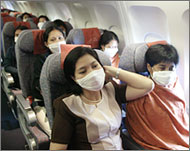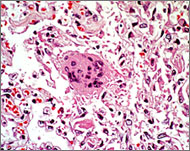Middle East airports on SARS alert
The Middle East has stepped up screening measures across airports in order to stave off a SARS outbreak. Kuwait is the only country to have reported a probable case after an American woman visited Hong Kong in late April
The threat of Severe Acute Respiratory Syndrome (SARS) has prompted some Middle East countries to screen travellers flying into their airports, particularly those from Asian nations, in an effort to contain the deadly disease.
“We have travellers coming from all over the world, including the affected areas,” said Dr. Zuhair Hallaj, who heads the division of communicable disease control for the World Health Organization’s (WHO) Eastern Mediterranean section in Cairo.
 |
|
Passengers from Asia are checked |
But the region has stepped up precautions to ward off the disease by increasing screening measures for passengers arriving or leaving to affected countries and implementing WHO recommendations.
Affected countries according to the international health body include Canada, Singapore, China and Mongolia. The WHO called on travellers from these places to be screened at the point of departure.
Hallaj said passengers from these areas across the region were examined by medical authorities at airports and warned against panic.
“There are more than 200 diseases with (symptoms of) fever and cough…we don’t want people to panic for no reason,” he said.
Kuwait is the only Middle Eastern country which the WHO reported had a probable SARS case. The patient was an American woman who had returned from Hong Kong but recovered after checking into a hospital. Since then, Kuwait hasn’t reported any other cases.
“If a case is imported into a country and there are no secondary cases that means the country is taking the necessary measures,” said Hallaj.
The WHO urged countries to establish a monitoring system for possible outbreaks of SARS. “There is a need to have a system to isolate and watch out for possible SARS cases,” said Christine McNab, a WHO spokesperson.
Once suspected cases have been recognized patients need to be immediately placed in an isolated area. “Hospitals and medical facilities need to properly isolate patients,” said McNab, adding SARS had spread quickly in hospital settings where doctors and nurses hadn’t taken necessary steps.
Qatar, which hosts a large population of migrant workers from Asia, has reported two suspected cases.
“We do not have confirmed cases of SARS. We have suspected cases,” said Qatar Health Minister Hajar Ahmad Hajar. The first case is an American of Chinese origin who had been in contact with an Asian person two weeks before reporting a fever, said the health minister. The second suspected case is an airline hostess who was in Thailand 12 days ago.
“Both are considered low-risk and we are just taking precautions,” said Hajar. The two suspected cases reported fever more than 10 days after being in possible contact with infected people. A blood sample from the American-Chinese had been sent to the Centre for Disease Control and Prevention (CDC) and he is now recovering.
Hajar said there has been increased screening for travelers.
“Anybody who is coming from China, Honk Kong, Taiwan, Vietnam and Singapore are not allowed to enter the country,” said Hajar. “Those coming from the Philippines, Canada and Thailand, whether they are leaving or entering the country, are examined by a health authority.”
Travellers have their temperature taken since a fever of 38 degrees Celsius is the first warning sign of a suspected SARS case, said Hajar.
 |
|
A slide image showing lung tissue |
The WHO’s website recommends international travelers be aware of the main SARS symptoms, including fever, dry cough, shortness of breath or breathing difficulties.
Hajar said all Qatari citizens who may have visited China, Hong Kong, Taiwan, Vietnam and Singapore are taken immediately from the airport to an isolated building and quarantined for 5 to 7 days.
Qatar’s Rumaila hospital has designated a building for suspected cases of SARS. . It has two isolation areas: one for those who are suspected of having it and a second building for those who have no symptoms but had visited the infected countries or been in contact with someone from there.
“Teams of doctors and nurses are not allowed to circulate in other areas,” said Hajar. Special accommodation has been established for these medical teams, he added.
Hajar said he was not concerned about a SARS outbreak in Qatar, pointing out while it was more dangerous than the common cold, the latter was more contagious.
Lebanon, another host to a large Asian community, has also stepped up screening measures at it’s international airport.
Dr. Nabil Salam, chief of the preventive medicine department at Lebanon’s Health Ministry, said there are no SARS cases in Lebanon.
The Lebanese health ministry has asked all airlines flying in from South Asian countries to notify them beforehand. Passengers are checked by medical authorities and those with symptoms, including fever, a dry cough and a shortness of breath, are immediately quarantined in the Karantina hospital, said Salam.
Those without symptoms coming from affected areas fill out a form including their address and telephone number. Medical authorities call them on a daily basis for 10 days, he said.